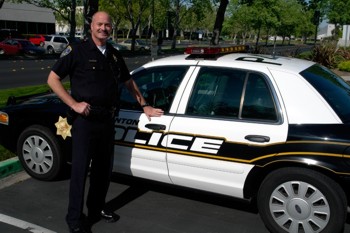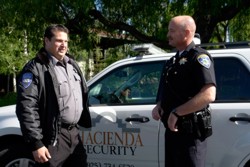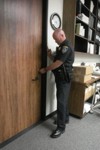Businesses Can Be Pleasanton Police Department's 'Eyes and Ears'
Businesses Can Be Pleasanton Police Department's 'Eyes and Ears'



A sense of safety and security is one of the most prized attributes a community has to offer, and Pleasanton, with crime rates just a fraction of the national average, has an enviable record in this regard. The success is no accident. A proactive and well-trained police force, along with an aware and engaged citizenry, are two main factors that make the city such a comfortable place in which to live or work.
The community's businesses have a well-defined role to play in the joint police/citizen effort, notes Ken McNeill, Crime Prevention Officer with the Pleasanton Police Department (PPD). The business side of the collaboration closely parallels the Neighborhood Watch programs in effect in the city's residential areas. "Businesses and residents rely on the police to protect them from crime, but it is shortsighted to believe that we are everywhere at one time," McNeill observes. "We count on others to be our eyes and ears."
Just what kinds of things should those eyes and ears be on the alert for? McNeill has several insights into crime prevention he willingly shares with the Hacienda community. Many of the safety principles revolve around awareness, since visibility creates vulnerability for the "bad guys."
Awareness
One aspect of awareness entails getting to know your environment and its occupants. A strong sense of who and what belongs helps to make anything out of the ordinary stand out, McNeill explains. "It's important to be proactive," he comments, encouraging business owners to "walk next door, exchange contact information, and suggest keeping in touch."
If you do notice something suspicious, McNeill urges making a call to the police department, right away. "If you believe you have seen suspicious or criminal activity, or something that doesn't seem right, use your own judgment on whether to call 911 or the business line, but either way we can respond." Under these circumstances, there should be no concern about crying wolf. "We want people to call," he emphasizes. "They should not be afraid of bothering us. We would rather respond and have it be nothing than come out and take a report from the victim of a crime that could have been avoided by a phone call."
Visibility
Visibility into the interior premises affords another level of protection. Items on display in the windows, like posters or signs, should be positioned so they don't obscure the view, either in or out. Cash registers should be in plain sight toward the front so any inappropriate activity will likely be noticed. Shrubbery around the building exterior should be trimmed back to eliminate potential hiding places. "Robbers don't like to feel exposed," McNeill remarks.
Lighting is a similar deterrent, and McNeill reminds business owners to conduct periodic checks to make sure all fixtures are not only operable but also bright enough to illuminate inside and out.
One exception to the visibility-is-good rule relates to automobile contents. "Auto burglaries are the most frequent crime we see in Pleasanton, and probably the whole Tri-Valley," McNeill reports. "A lot of these are crimes of opportunity. People leave items of value in the car in plain sight, and it only takes a few seconds to break the window, grab the item, and go." The best remedy is stowing valuables in the trunk when leaving a parked car. "If people took the time to put their possessions away, we could eliminate a high percentage of the city's crime."
Obstacles
McNeill also advocates creating a series of obstacles in the business to slow down potential wrongdoers. "Every obstacle prolongs the time the bad guys have to spend trying to commit their crime. The longer it takes, the less likely they are to stick around," he notes.
A comparable delaying strategy applies to the retail businesses and restaurants that handle large amounts of cash. For example, a time-lock safe is effective because it creates a waiting period after the combination has been entered and before the door opens. Thieves do not like to linger.
It is also helpful to have a written cash management policy. "The important thing with cash is to minimize exposure," says McNeill. Once there is a specified amount in the cash drawer, transfer it all to the safe. "That way, you won't lose a whole day's receipts in a robbery. Vary the time of day when bank deposits are made, and don't take the same route every trip," he continues.
McNeill also recommends installing, at the least, a security alarm system, or even better, video surveillance, "the higher the quality, the better." These measures should be obvious to the general public. "Advertise in the front window that your business is equipped with these security features. Criminals pay attention to such messages, and they'll go look for an easier target somewhere else."
Other Threats
Today's stresses have unfortunately brought about a new type of threat, the disgruntled employee or unwelcome individual. "If there's an issue or the possibility of some kind of disturbance, through a firing, for example, we can come out and stand by, making sure to keep the peace while the parties go their separate ways," McNeill says. The PPD can also help explain the steps to obtain a restraining order if the business owner feels it is appropriate. Employees will need to recognize who the undesirable person is, so if he or she is seen on the property, they can give the department a call.
Pleasanton does have a S.W.A.T. team; fortunately, deployments are infrequent, but "should it ever be necessary, it is just a few phone calls away," McNeill points out, adding, "More and more patrol officers are being trained to respond immediately to situations that may involve violence." Those capabilities give the department more latitude in formulating an emergency response.
Once again, he underlines the importance of the initial call to the police department. "We can't be proactive if we don't know about something bad that might be happening. That's the most important thing. It's no harm, no foul if there's no crime."
Site Visits
Officer McNeill and his partner, Community Service Officer Shannon Revel-Whitaker, are both available to visit Hacienda businesses to talk about the various aspects of the Business Watch program. They can address topics ranging from avoiding Internet crimes like phishing and identity theft to recommending safety improvements in the workplace after a walk through the facility. They also have several helpful brochures to distribute. Contact McNeill directly at (925) 931-5233, or Revel-Whitaker at (925) 931-5240.
Tips From the Pros
Officer McNeill offers these additional tips to make the workplace safe and secure:
-
Secure your facility. Be certain that all doors and windows are locked when the business is not occupied. During business hours, be sure that back doors are secure so that persons cannot enter the business undetected. Openings such as skylights and roof hatches should also be secured to prevent unwanted entry.
-
Secure keys. Create a system to control facility keys, as well as a system to account for their whereabouts.
-
Visitor identification. Have someone at a front desk, either a security person or receptionist, who can control and track visitors throughout the workday. Create a guest sign-in/sign-out sheet and a process for issuing and collecting visitor passes. Check employee badges on a regular basis and be familiar with those who work on site.
-
Alarm systems. Alarms are the number one deterrent to burglaries. If you have one, make sure employees know the pass codes and how to operate the system, and that it is used. For information about the city's alarm ordinance, call the PPD's Crime Prevention Unit at (925) 931-5233 or 931-5240, or view a copy at www.sterlingcodifiers.com/CA/Pleasanton/index.htm.
-
Report needed repairs. Create a system for employees to report a problem such as inoperable lighting or a door that does not lock properly. Attending to these issues in a timely manner can help keep your business a safer place and potentially prevent crime.
-
Document shredding. Have a system for shredding all paperwork that contains personal information about employees, customers, or the business. Take every precaution to prevent your business and your employees from becoming victims of identity theft.
-
As part of the effort to become more security-minded, businesses need to consider emergency preparedness. A comprehensive article about emergency preparedness in the Tri-Valley appeared in the September 2008 issue of NETWORK. Find a copy at www.hacienda.org/ho/nw0809_Emergency.html.
Personal Safety at Work
The Pleasanton Police Department adds that it is always a good idea to review these personal safety considerations as well:
-
When away from home, at work or not, do not carry large amounts of cash or more credit cards than necessary. Be sure to keep account numbers and 800 numbers in a safe place, so you can call credit card companies and banks if you become the victim of a theft.
-
Lock all personal items in a drawer or locker when away from your desk. Secure laptop computers and shut down your computer if you will be gone for a long time. Do not leave personal information visible on the screen while you are not present.
-
Before entering an elevator, observe the other passengers. Stand near the controls. If you do not feel comfortable, make an excuse and do not board. Leave, if you are on an elevator and the people entering make you feel uncomfortable.
-
If you are staying late, move your car closer to the building, in a well-lit area, before others have left or darkness falls. Work with a buddy, if possible. If alone, make it look like there are others present - turn on the lights and play the radio. Make sure someone else knows your plans. If you are not comfortable leaving alone, you can call Hacienda Security at (925) 734-6520, to escort you to your car.
-
If you need to call the local police from your cell phone, dial (925) 931-5100, the non-emergency phone number. All 911 calls placed from cellular phones are routed to the local CHP office and the operator will not automatically know who or where you are, delaying response.
-
When in the car, keep your doors locked and windows closed.
-
If there are people loitering near your car, get someone to accompany you and stay until you depart.
-
If you are being followed, go to any open public establishment, enter, and call 911; or call police from your cell phone, if you can do so safely.
Hacienda Security
Hacienda Security handles day-to-day security within the park. Officers are on high-visibility patrol 24 hours a day, every day of the year. Their presence is one of the best deterrents to crime, accidents, vandalism, and malicious mischief.
Hacienda Security can be reached by phone or email around the clock. Use either the voicemail/paging system at (925) 734-6520, or send an e-mail to security@hacienda.org and your note will be forwarded to the Lead Security Officer. A complete description of Hacienda's Security program is available online at www.hacienda.org/services/services_security.
Photo: Ken McNeill is Pleasanton's Crime Prevention Officer, a position that allows him to work with Hacienda Security and conduct business security inspections.
Also in this issue...
- Two Anixter Divisions Benefit from Joint Hacienda Location
- Elluminate Walks the Walk of Online Learning
- Business Bits
- Executive Profile: Brian Carbine, Dianne Adair Enrichment Programs
- Hexagon Transportation Consultants Find Urban Design Shifting Toward Higher Densities and More Choices
- Frasco Investigative Services Tracks Down Insurance Fraud
- Businesses Can Be Pleasanton Police Department's 'Eyes and Ears'
- Tri-Valley One-Stop Career Center Offers Many Helpful Services for Employers and Employees
- Protect the Earth: Join a Car- or Vanpool with Help from 511 Rideshare
- Golf Tournament Benefits Autism Group
- A Taste of Summer
- Hacienda Index
- Calendar




